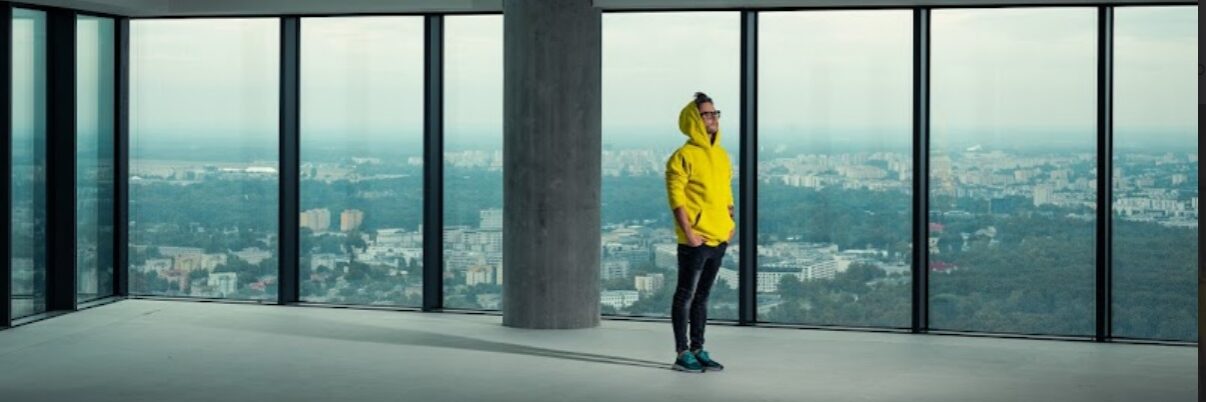The hardest kind of love
Culture has always played a very important role in the process of our development. By touching on difficult social topics, examining human nature and asking unanswered questions, we force ourselves to make an intellectual effort, broaden our horizons and look for sensitivity and understanding in us. The tenth muse is no different. It is the cinema that in many cases familiarizes us with topics that are difficult for us to discuss even with our loved ones. A movie is a kind of an instrument, and an extremely sensitive one, capable of presenting unspeakable secrets that escape the careless observer. Certainly, this is the work of one of the most inquisitive and posing the most difficult questions of the Polish director, Tomasz Wasilewski. We had to wait 6 years to get to know his latest work, ‘Fools’, which is his boldest and most controversial film to date.
Anna Domin: When the name Wasilewski appears next to the title of the film, one can assume that it will be about difficult love and that it will not be pleasant. It was like this from your debut ‘In the bedroom’, through ‘Floating Skyscrapers’, to ‘United States of Love’. And so it is now, although much stronger and clearer. Once again, you open a drawer that no one in their right mind willingly looks into. You take up the subject of a very difficult love – forbidden because it is embedded in the incestuous relationship between mother and son. There is no more difficult love.
Tomasz Wasilewski: ‘Fools’ is certainly not a film about an incestuous relationship, but about many very important and difficult feelings, emotions and relationships. First of all, it is a film about motherhood and its faces in a very broad aspect. About being a mother, but also about becoming a mother again in adulthood. It is also a film about family and relationships, about struggling with illness, coming to terms with death and, finally, about the love of two people. Of course, the whole is built on the backbone of the incestuous relationship and the drama of this family, the relationship between mother and son, between lovers, the love of Tomasz and Marlena and the lack of understanding of this kind of a relationship. I reached for it because it seemed to me the most difficult type of love, also for me as a person embedded in culture, religion and accepted norms. I wanted to face this topic in order to walk this path, get out of my comfort zone and think about my tolerance, because it turned out that I too have a lot of limitations that I had to overcome while working on this film.

Photo: Michał Topolan
The viewer also has a lot of work to do because of you. He or she has to deal with something very difficult, forbidden, a subject that escapes the accepted norms. One could say, with unspoken and even forbidden content written by life itself.
This film of all my films is definitely the most polarizing, at least I think that. I also see how much anger arouses, not even the film itself, but embedding the topic in such a difficult relationship. In our space, there is no space at all to talk about or in any way deal with this topic. The type of such a relationship is clearly associated with one of the greatest sins, i.e. the thought of condemnation, rejection, being evil or perverted immediately comes to mind. However, we are also talking about a relationship between two adults who enter this relationship consciously, who are connected by a deep feeling. On the other hand, if we look at the elements of our past, or even the history of Christianity, such relationships between family members existed and were not stigmatized in any way. When we were documenting the film, it turned out that this kind of relationship exists throughout the time, and in this context it is nothing new. What is probably new is showing this topic without judging, without building a context for such choices, using only the emotions of the characters to describe the process, which the viewer has to experience together with Marlena, Tomek and other characters from the film.
These emotions go deep under the skin. This is certainly due to the means of expression: from the stage design, wide shots, characteristic architecture, through the sounds of nature, to the cry of suffering and the emotions of the main character.
We built for them the perfect end of the world, and for this end of the world, such people could run away from the world with their love. I wanted to show this idea of a safe place for their relationship. Nature also plays a very important role. It enters these interiors, as if it adds or emphasizes the type of emotions that the characters are experiencing. It helps to portray more literally what happens inside of them. I pay a lot of attention to the architecture that appears in my films too, to how the interiors look like. Everything that the viewer sees in the film has been created and is in fact synonymous with the universality of the subject. There is no reference to time or social context here. Of course, I could have done that, and then the film would probably have been more realistic and literal, but I just wanted to lose this literalness, so that the viewer would not see the film as a story, but would be able to touch more strongly the very subject that the characters face.
In addition, the lack of music embedded, even between scenes in which dialogue takes place, puts the viewer quite close to the characters. This makes us face what the hero is experiencing even more strongly
It was very important for me that the viewer feel what Marlena feels. The entire movie happens in real time, there are no cuts. The viewer is confronted with what the main characters are going through and there is no escape from it. There are no shortcuts. I put the viewer ‘in clear’ with this story, with these emotions. There are scenes in which you can feel the density of the atmosphere physically, the inability to get out of the box, the world in which the characters live, this claustrophobic feeling.

Photo: Michał Topolan
And that’s probably why the film gets under the skin so much, because you have to be in it all the time, and yet at times you would like to leave.
Like Marlene. She would like to run away too, but she can’t.
One has to focus on difficult emotions and, as with all your films, you leave the cinema with extra baggage of experiences that will simply stay. So, do you think that you somehow educate the viewers by opening their eyes to difficult topics?
It’s never my goal, if it comes out that way, it’s probably a coincidence. I am not a missionary. I want to move viewers, make them feel more: annoy them or make them laugh – stimulate them emotionally, ask questions without imposing answers. In my films we will not find an answer to the question of what is allowed and what is not. It is important to me to focus on emotions, also felt in many layers, repressed or giving rise to frustration. That’s how I perceive film and art, and that kind of art matters to me. It is also the case that the film, of course in a metaphorical context, begins for the viewer only after leaving the cinema. It’s no different with ‘Fools’. After one of the screenings, I happened to talk to the audience gathered in the auditorium for another hour, and it probably would have taken longer if we didn’t have to leave the space for another screening. This is a value and motivation for me to tackle difficult topics.

Photo: Michał Topolan
Last but not least, I would like to make sure you won’t let us wait another 6 years for your next film. Are you already working on something new?
Yes, I am currently working on the script. The film will also be about family. I will take a closer look at the social roles that we fulfill or play in society. But, unlike the ‘Fools’, where I deprived the story of the naive hope that love can survive anything, this time I will look for that quality. I’m at such a stage of my creativity that I’m starting to need it myself.




